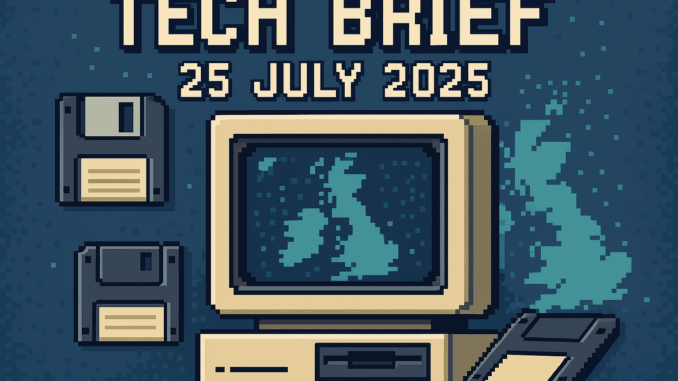
There was a time when the scariest thing on your computer was a floppy disk labelled ‘DO NOT OPEN’. Tech Brief 25 July 2025 dives into today’s cybercrime headlines, fintech shake-ups, and a Microsoft milestone, showing how our digital anxieties and ambitions have grown. Missed yesterday’s Tech Brief? Catch up here before diving in.
Canterbury Student Jailed for £100m Phishing Kit Fraud
It’s the digital equivalent of a master forger slipping invitations into the post, except now, the ‘post’ is your inbox, and the stakes are millions. Ollie Holman, a 21-year-old student from Canterbury, has been sentenced to seven years in prison after designing and selling phishing kits that enabled criminals to steal more than £100 million. According to The Guardian, Holman’s software mimicked official government and bank websites, targeting UK institutions and harvesting sensitive data from unsuspecting users.
This story brings to mind the resourcefulness of bedroom coders and homebrew enthusiasts, but with a darker twist. As technology has evolved, so have the risks. Swapping virus warnings on floppy disks was once a community ritual; now, digital vigilance is a daily necessity. For all of us navigating today’s digital world, it’s a reminder that every leap forward brings new risks and new stories to share.
UK Falls to Third in Global Fintech Rankings as UAE Overtakes
It’s like watching the home team lose its long-held spot on the podium. The United Arab Emirates has overtaken the UK for second place in global fintech, pushing Britain to third for the first half of 2025. Computer Weekly reports that shifts in investment and a changing tech-hub landscape are behind the switch.
For decades, the UK led the race with icons like Sinclair and ARM setting digital standards. Now, the challenge is to adapt or risk becoming a footnote. This moment isn’t just about numbers on a chart; it touches national pride, the future of British digital leadership, and the legacy built by unsung pioneers – engineers, developers, and entrepreneurs who shaped the sector from the ground up. The fintech sector must now decide whether to evolve or be overtaken again.
Europe Warned Over Microsoft Cloud Dependency
Despite years of debate about digital sovereignty, European public sectors are now deeply reliant on Microsoft cloud services. New research, covered by Computer Weekly, warns that this dependency could stifle competition and innovation. The risks of platform dominance are nothing new. With the bundling of Internet Explorer with Windows in the 1990s, concerns about vendor lock-in became central to tech policy debates.
The call for diversification goes beyond technical resilience. It is about preserving choice and flexibility for users and governments alike. As cloud infrastructure becomes the backbone of public services, the tactics of big players have shifted, but the stakes remain high. Watching these cycles repeat, from bundled browsers to today’s cloud giants, makes the parallels impossible to ignore.
From the Wayback Machine
On This Day: 1990 – Microsoft Passes $1 Billion in Revenue
On 25 July 1990, Microsoft became the first personal computer software company to exceed $1 billion in annual revenue, powered by MS-DOS 4.x, Windows 3.0, and the newly integrated Office suite. This milestone marked software’s dominance over hardware as the main driver of the tech sector. Let’s not forget the engineers behind the scenes, like Charles Simonyi, whose work on Word and Excel helped turn Microsoft Office into a household name, or the countless British developers whose innovations powered the fintech revolution. The platform ecosystem model that Microsoft built then still influences today’s cloud strategies, making this a moment worth remembering.
What This Means
Tech Brief 25 July 2025 shows how digital risks and opportunities are rooted in decades of technical ingenuity and user choice. We’re all part of a community that inherits both the triumphs and the pitfalls of tech innovation. Let’s stay curious, alert, and ready to shape the next chapter together.
What was your first brush with a computer scam or the moment you realised software could change the world? Share your story below, and let’s keep our digital heritage alive, one memory at a time.
Missed yesterday’s Tech Brief? Catch up here.

Leave a Reply